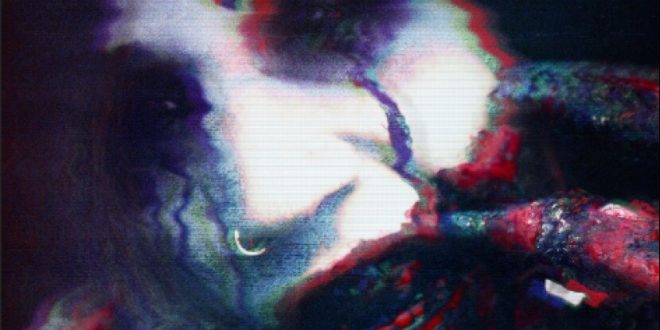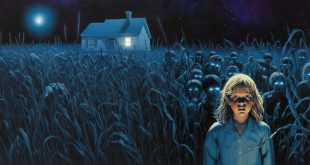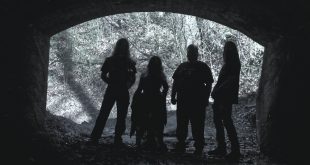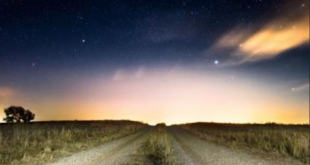Dawn of Ashes is a Los Angeles-based industrial metal act led by Kristof Bathory. Formed in the year 2000, Bathory has carried the band through several lineup and stylistic iterations, with longtime keyboardist Bahemoth alongside new blood in drummers Krz Souls and Krock. Last Wednesday, the band released their latest album and 15th release to date, Scars of the Broken. The album marks a reinvigoration of their classic sound, matched by an unbridled lyrical sincerity that solidifies the band in their present form.
I caught up with Bathory to discuss his formative experiences in music, two singles from the album that resonated with me, and what he has gleaned in relation to the band’s endurance.
You guys have been together since 2000. Going back a bit, when you were a kid, what was your musical environment like, and how did that inspire you to become a musician?
Growing up in the 80s and 90s, I was constantly surrounded by music. I can remember one memory that has stuck with me in terms of why I wanted to become a professional musician. Normally, I listened to whatever my had had put on, since he was a musician himself. But one day, I picked up the White Zombie album Astro-Creep 2000, put on my headphones, listened to it, and just kind of visualized myself on stage. It would give me this energy – this feeling that I couldn’t replicate before. Every time I’d listen to certain albums, I’d feel that same energy, and it made me decide that that’s what I needed to do.
In the early 2000s, nu metal and pop were at their peak, but you also had industrial music branching off as its own thing in the underground. What can you tell me about your early efforts in the music scene?
Well, prior to Dawn of Ashes, I was in multiple death metal, hardcore, and punk bands, and I actually had a rough time dealing with other musicians, so, once I began this project, I wanted it to just be me and maybe one other person, doing industrial and black metal music. Then, I started frequently going to the industrial goth clubs. I’ve always been aware of industrial bands like Skinny Puppy and Ministry, and when I was in the clubs, I’d be exposed to music by these other acts that I’ve never heard before.
After some time, my plan was to turn Dawn of Ashes into a full band, since I missed the elements of being in one. That’s how it started, from feeling burnt out with other musicians and wanting to start something on my own.
Once Dawn of Ashes turned into a band, how were you able to accumulate support?
By the time Dawn of Ashes became a thing, there was still no social media. I can remember with the first demo I wrote, I’d stand outside the venue and pass out CDs because around this time, you couldn’t easily post your demos online for everyone to hear. That was the first attempt at getting the band’s name out there, and we ended up getting a good following off our demo. Then Myspace came along.
That was the next step, right?
Yeah! I started working with one other person, and after posting some songs on our Myspace page, we grew from there.
Assessing the growth from both your demo and your presence on Myspace, are you surprised that many of those same fans have stuck by you?
Yeah. I feel that, through the years, we’ve kept a strong fan base. The fans that had listened to us back then are a lot older now, but they’re still following us, and I think that’s awesome. I really appreciate that. Also, now it feels like we’re bringing in a younger crowd that wasn’t exposed to the band back then. To be able to give the old fans what they expect and the new fans something they haven’t heard before, it’s a blessing in a way.
That kind of transcendence makes you realize, “Holy shit, we do have something that continues to resonate.”
Yeah, and I think the biggest trip right now is talking to people and hearing, “You know, I grew up listening to Dawn of Ashes in high school!” It really trips me out. I mean we’re going on over 20 years now, and to know these people were listening to your music when they were very young seems kind of bizarre to me.
Especially with Myspace being such a product of its time.
Yeah, right (laughs)!
Getting to your new album, you mention “Scars Of the Broken has been one of the most emotionally difficult albums that I have ever created. All of the musical and lyrical content was straight from a place that I have been dealing with for a long time of my life.” Do you feel that with the dialogue around mental health becoming more widespread especially these days, and in releasing this album, you’ve been able to effectively make the statement you’re making now?
Well, at the time I wrote the album, my primary intention was to release it for myself, rather than for other people. It was more so something I felt I had to do. But at the same time, I knew that it would resonate with others – those who feel alone while facing these obstacles. I know that for myself, growing up, I’ve always looked up to certain bands, and I notice that many of our younger fans look up to us. In certain instances, kids don’t grow up having very much, or maybe their parents aren’t by their side, so they’re lonely, but this is a great way for fans to connect with something musically.
Right off the bat, the album’s first two singles, “EMDR” and the title track, resonate with me in a big way. What was it that inspired those songs?
EMDR [eye movement desensitization and reprocessing] is a treatment for trauma victims – people who have post-traumatic stress disorder. It’s a specific type of therapy that was done on me, and while it was happening, I slipped into this trance, and that’s when I went down really hard into this hole. That’s why I’d decided for this to be the first single and music video, since that was such an intense moment in my life.
As far as the title track, that’s an anthem for all the fans who feel broken, and feel like they’re in a circle of people who deal with these situations, but as if people on the outside don’t understand them.
With the song “EMDR,” the lyric that stuck out to me was “I feel so empty without the abuse.” It’s as if to convey how, at that low period in your life, you’d grown used to the mania and subsequent spiral downward due to inconsistent treatment. so much that when you receive the kind of love from someone that’s consistent, you slowly begin to tune it out, or else, randomly stir up tension on purpose, simply to keep things thrilling.
You know, it’s almost like I wrote that line with the same thought process of fearing success. Being relieved of trauma can sometimes be scary for others, so they feel more comfortable reliving it over and over.
In other words, they feel themselves constantly chasing after something they tried previously running from.
Yeah. It’s almost like a person in the military who goes to war, experiences really fucked up traumatic things, and then comes home and lives a somewhat normal life, but still perceives that trauma, even if it’s no longer there. It’s a really interesting feeling.
I see, and with the title track, the sentiment seems to be that you recognize that you’ve grown from these challenges, but if you didn’t experience them at all, there’s no telling how you might turn out.
Right, and I’ve noticed that people who experienced these types of situations tend to develop thicker skin. They become survivors, and it’s a lot easier for them to get through, compared to someone who hasn’t gone through them. I’ve always felt like you need to put your mind in that place, you know?
In terms of getting this album sounding the way it does, how do you go about the process?
I usually write everything except for guitars, which I like to dictate how I’d want them to sound. On this album, I’ve experimented with a lot of hardware like different Eurorack modules, but the lyrical content is what really creates the album; it separates itself from everything else I’ve done, which is why it took as long as it did to write.
With this album and lineup in particular, do you feel like your bond as a band has gotten stronger?
Well, there’s always been lineup changes in Dawn of Ashes. I literally have one person who’s been in the band for the past 15 years or so – somewhere around there. It took me a while to find members that I actually connect with, so everyone who’s in the band now are really close friends. It’s kind of like we’re a family now. The connection is there, even if we’re not doing music. I’ve been in situations where I couldn’t stand anybody, and I think that’s important, when it comes to working together and touring together, that you have good chemistry with one another.
Considering your career as it stands now, what have you learned about yourself, both as a musician and as a person?
That’s a question I would take forever to answer, but only because I’ve gone through a lot of shit throughout the history of Dawn of Ashes – some good, and some bad. If anything, I’ve learned to keep the fire ignited, and just keep going no matter what’s going on in my life.
Lastly, anything you’d like to say to your fans?
To touch upon what you said earlier, about the fans that have actually stuck around since the beginning, I appreciate them. They are the reason why Dawn of Ashes is still alive. Anyone who picks up our albums in any way, that always means so much to me.
 Music Existence Because of Music, We Exist
Music Existence Because of Music, We Exist




